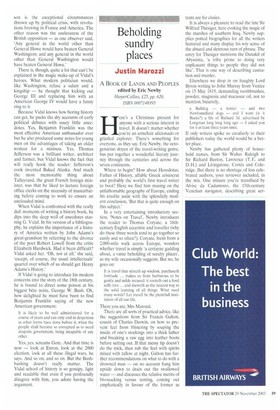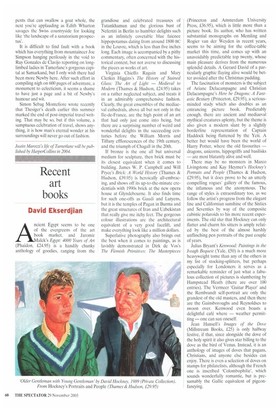Beholding sundry places
Justin Marozzi
A BOOK OF LANDS AND PEOPLES edited by Eric Newby HarperCollins, £25, pp. 620, ISBN 0007149395 Here's a Christmas present for anyone with a serious interest in travel. It doesn't matter whether you're an armchair aficionado or grizzled explorer. There's something for everyone, as they say. Eric Newby, the octogenarian doyen of the travel-writing genre, has put together a wonderful literary journey through the centuries and across the seven continents.
Where to begin? How about Herodotus, Father of History, affable Greek aristocrat and probably the world's first travel writer to boot? Here we find him musing on the unfathomable geography of Europe, ending his erudite aside with the splendidly modern conclusion, 'But that is quite enough on this subject.' In a very entertaining introductory section. 'Notes on Travel'. Newby introduces the reader to Thomas Coryate, a 16thcentury English eccentric and traveller (why do these three words tend to go together so easily and so often?). Coryate, fresh from a 2,000-mile walk across Europe, wonders whether travel is simply 'a certayne gadding about, a vaine beholding of sundry places', as my wife occasionally suggests. But no, he goes on:
It is travel that stirred) up wisdom, purchaseth fortitude .., makes us from barbarous to be gentle and milde natured: it rooteth out a fond selfe love ... and shewcth us the nearest way to the solid learning of all things. What need many words? Let travel] be the plentiful] institution of all our life.
There you are. Mrs Marozzi.
There are all sorts of practical advice, like the suggestions from Sir Francis Galton, cousin of Charles Darwin, on how to prevent feet from blistering by soaping the inside of one's stockings into a thick lather and breaking a raw egg into leather boots before setting out. If that messy tip doesn't do the trick, then rub the feet with spirits mixed with tallow at night. Galton has further recommendations on what to do with a drowned man — on no account hang him upside down to drain out the swallowed water — and discusses the relative merits of bivouacking versus tenting, coming out emphatically in favour of the former as
tents are for cissies.
It is always a pleasure to read the late Sir Wilfred Thesiger, here evoking the magic of the marshes of southern Iraq. Newby supplies potted biographies for all the writers featured and many display his wry sense of the absurd and dextrous turn of phrase. The entry for Thesiger mentions the Danakil of Abyssinia, 'a tribe prone to doing very unpleasant things to people they did not like'. That is one way of describing castration and murder.
Elsewhere we drop in on haughty Lord Byron writing to John Murray from Venice on 15 May 1819, demanding toothbrushes, powder, magnesia and macassar oil, not to mention, bizarrely, a Bulldog — a terrier — and two Newfoundland dogs — and I want (is it Bucks?) a life of Richard 3d. advertised by Longman long long long ago — I asked you for it at least three years since.
If only writers spoke so cavalierly to their publishers today the world would be a better place. Newby has gathered plenty of household names, from Sir Walter Raleigh to Sir Richard Burton, Lawrence (T. F, and D. H.) and Livingstone, Cortes and Coleridge. But there is no shortage of less celebrated authors, your reviewer included, in the mix, One minute you're transfixed by Alvise da Cadamosto, the 15th-century Venetian navigator, describing great ser pents that can swallow a goat whole, the next you're applauding as Edith Wharton savages the Swiss countryside for looking like the landscape of a sanatorium prospectus'.
It is difficult to find fault with a book which has everything from mountaineer Joe Simpson hanging perilously in the void to Ruy Gonzales de Clavijo reporting on longlimbed ladies in Tamerlane's gorgeous capital at Samarkand, but I only wish there had been more Newby here. After such effort in compiling nigh on 600 pages of adventure, a monument to eclecticism, it seems a shame to have just a page and a bit of Newby's humour and wit.
Simon Sebag Montefiore wrote recently that Thesiger's death earlier this summer marked the end of post-imperial travel writing. That may be so, but if this volume, a sumptuous celebration of travel, shows anything, it is how man's eternal wonder at his surroundings will never go out of fashion.
Justin Marozzi's life of Tamerlane will be published by HarperCollins in 2004.



























































































 Previous page
Previous page